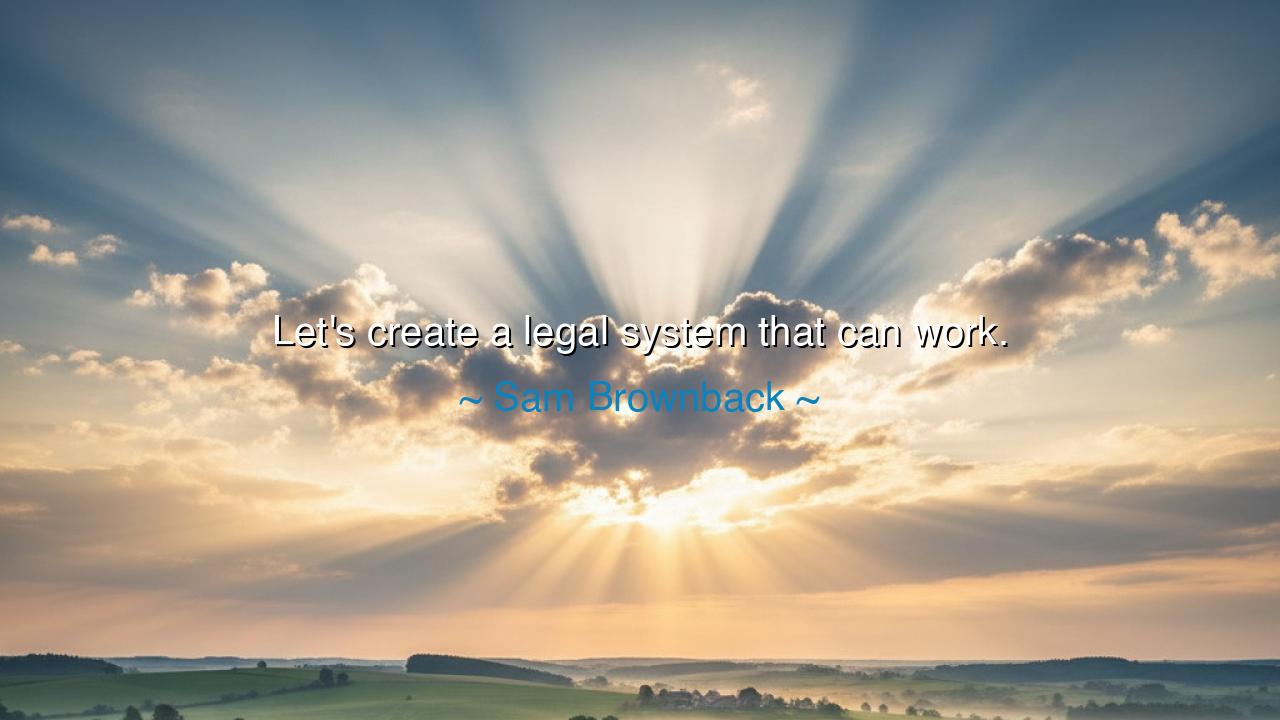
Let's create a legal system that can work.






There are statements so simple that they sound almost ordinary, yet within them burns the fire of civilization itself. When Sam Brownback declared, “Let’s create a legal system that can work,” he was not merely speaking of policies or courts — he was invoking the ancient yearning for justice that lives and breathes, for a system that serves the people rather than oppresses them. His words call for a rebirth of law, not as parchment written in cold ink, but as a living force — a system that protects, uplifts, and restores rather than punishes blindly. This quote is both a command and a prayer, a plea for order infused with compassion.
The origin of this quote comes from Brownback’s career as a statesman and advocate for reform — particularly in his years as a U.S. Senator and later as Governor of Kansas. He often spoke of rebuilding systems that had grown tangled and inefficient, especially within criminal justice, where punishment too often replaced redemption, and within governance, where bureaucracy smothered the will of the people. His words are born from frustration with the decayed machinery of modern law — a system that too often works for the powerful and fails the powerless. When he said, “Let’s create a legal system that can work,” he was speaking against the rot of complacency — the endless debates, the partisan walls, the legal codes that no longer serve their purpose. He sought a return to the spirit of justice, to the law as it was meant to be: fair, clear, humane, and effective.
Throughout the ages, societies have risen and fallen by the strength of their legal systems. The ancients knew this truth well. In the twilight of the Roman Republic, Cicero cried out for laws that served the common good, lamenting how greed and corruption had turned justice into a tool of the elite. The Roman Senate had laws aplenty, yet few that worked — statutes written with grandeur but twisted in practice. Rome fell, not for lack of power, but for lack of trust in its institutions. The same cry echoed centuries later in revolutionary France, when the people, weary of courts that served kings instead of citizens, tore down the old order in a storm of righteous fury. The lesson repeats itself: when the law ceases to serve the moral order, it loses its authority, and the people withdraw their faith.
A legal system that can work must be more than efficient — it must be just. Efficiency without morality is tyranny in disguise. Brownback’s words resonate with the wisdom of Solon, the Athenian lawgiver who understood that laws must balance order with mercy. Solon abolished the cruel debts that enslaved the poor and established courts where all citizens could appeal. His reforms, though imperfect, gave Athens the foundation to flourish — proving that laws rooted in humanity endure far longer than those built on fear. So too must modern societies look upon their own systems and ask: Do they work for the living, or only for those who rule?
Brownback’s plea also speaks to the heart of leadership. To “create a legal system that can work” is to act with courage, for it demands reform not in comfort, but in conflict. It means confronting entrenched powers, bureaucratic inertia, and the arrogance of those who think justice is immutable. But history honors such reformers — men and women who dared to rewrite the rules to make them align once more with conscience. Consider Nelson Mandela, who, after twenty-seven years of unjust imprisonment, did not seek revenge but reconstruction. Under his vision, South Africa built a new legal foundation — one that aimed to heal rather than divide. That is the spirit Brownback calls for: the courage to build systems that work not just in law, but in love.
Yet the wisdom of this quote extends beyond governments and courts. Every person lives within their own “legal system” — the rules, judgments, and codes by which they measure right and wrong. To “create a system that can work” is also a personal task. It is to ensure that one’s principles are not too rigid to forgive, nor too loose to stand for truth. It is to seek fairness in one’s own dealings, to judge without cruelty, to listen before condemning. For as the ancients taught, justice begins in the heart before it ever reaches the courtroom. If we cannot govern ourselves with integrity, no government can save us.
So, let this quote be both challenge and charge: rebuild the systems that no longer serve truth. In law, in leadership, and in life, reject the structures that are hollow and lifeless. Write new rules where old ones oppress; build new paths where the law has grown cold. Let your conscience, not convenience, be your compass. For a society’s greatness is not measured by the thickness of its law books, but by the justice that lives in its people. In Brownback’s simple yet timeless call — “Let’s create a legal system that can work” — lies the eternal duty of every generation: to make the law not merely functional, but righteous; not merely efficient, but alive.






AAdministratorAdministrator
Welcome, honored guests. Please leave a comment, we will respond soon